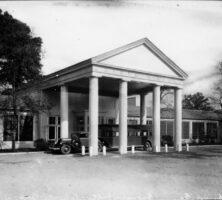The Roosevelt Warm Springs Institute for Rehabilitation developed around 88-degree (Fahrenheit) thermal springs that flow from the foothills of Pine Mountain in west Georgia. Tradition notes that Creek Indians brought ailing warriors to bathe in the springs to heal their wounds and spirits. The earliest known resort at Warm Springs dates to 1832, just four years after the establishment of Meriwether County. Cabins and a tavern housed as many as 200 people. Even more visitors could be accommodated after a rambling Victorian structure, the Meriwether Inn, was built in 1869.

Courtesy of the Roosevelt Warm Springs Institute for Rehabilitation
The pools and resort attracted families from as far away as Savannah before beginning to decline in the early twentieth century. Then, in the early 1920s, a young engineer named Louis Joseph, who had relatives in west Georgia, experienced remarkable recovery from the debilitating effects of polio after exercising at the pools. George Foster Peabody, a New Yorker and native Georgian who owned part interest in the springs, invited Franklin D. Roosevelt to visit.

Courtesy of the Roosevelt Warm Springs Institute for Rehabilitation
Roosevelt, the Democratic candidate for vice president in 1920, had contracted polio in 1921. Three years later he visited Warm Springs, which lay ten miles from the nearest paved roads and had few modern conveniences. After a few days at the pools, he felt that his legs had improved more than they had in the previous three years. He quickly grew to love the people and the countryside, which he explored by automobile. Other polio patients began to arrive in the spring of 1925, after an article appeared in the Atlanta Journal about Roosevelt “swimming his way to health.”

In 1926 Roosevelt invested two-thirds of his savings in property at Warm Springs and incorporated the Georgia Warm Springs Foundation in 1927. An enclosed pool funded by automotive pioneer Henry Ford’s son Edsel was added, and improvements began to be made. Physicians and physiotherapists worked with Roosevelt to develop muscle exercises. The “spirit of Warm Springs” became firmly entrenched as patients relearned to function in society and to laugh and enjoy life. Roosevelt’s experiences at Warm Springs during the 1920s were dramatized in the film Warm Springs (2005), produced by Home Box Office and starring Kenneth Branagh as Roosevelt and Cynthia Nixon as his wife, Eleanor.
After his election as president of the United States in 1932, Roosevelt continued to visit, usually in the spring and again in the fall for the annual Founders’ Day Dinner at Thanksgiving. He chose a secluded hillside near the springs to build a home, which soon became known as the Little White House. Roosevelt worked closely with architect Henry Toombs, a native of Cuthbert, on many building projects, including Georgia Hall (an administrative building and cafeteria), a school, a chapel, and an infirmary. On January 30, 1934, the first of the President’s Birthday Balls were held throughout the United States to raise money for polio research. They helped put the foundation on a sound financial basis and later became known as the March of Dimes.

Courtesy of the Roosevelt Warm Springs Institute for Rehabilitation
Roosevelt died at the Little White House on April 12, 1945, three years after he had deeded most of his property at Warm Springs to the foundation. In 1954, funded largely by the National Foundation for Infantile Paralysis, Jonas Salk discovered a vaccine that began to eliminate polio.

Courtesy of the Roosevelt Warm Springs Institute for Rehabilitation
In 1980 the facility was renamed the Roosevelt Warm Springs Institute for Rehabilitation, which is administered today by the Georgia Department of Labor. The institute encompasses 940 acres. New facilities have been added, and patients with post-polio symptoms, spinal cord injuries, strokes, and other disabilities find treatment at Warm Springs.










